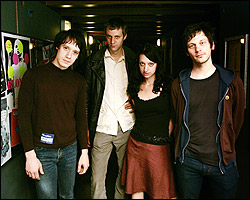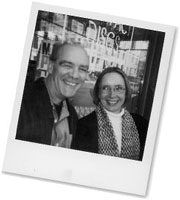QUASI, THE GOSSIP, THE MAGIC MAGICIANS
Showbox , 628-3151, $10/adv. 8 p.m. Fri., Sept. 21
WE TAKE WHAT WE NEED from pop music. And Quasi’s Janet Weiss knows that.
“It’s funny how people still write, ‘They say the records aren’t about each other . . .’ but they’re not, I swear to you—they’re not,” she says emphatically over the phone from her home in Portland. Weiss and her ex-husband Sam Coomes have endured a long cooling-off period—long enough, she says, that their lyrically driven, keyboard-based songs are no longer thinly veiled spears thrown at each other across the studio floor.
“It’s totally healed now,” she says. “For us, it means a lot that we’re still friends. We’re good friends. I mean, people can hear it however they need to hear it; I know oftentimes you put yourself into the song. In our case, people still put me in his songs and him in my songs. That’s just not how it is.”
But Weiss quickly concedes that listening to music has much more to do with fantasy than it does with reality. She understands her audience implicitly and doesn’t seem to mind that we make what we want to out of Quasi’s classic-rock-meets-indie-pop commotion. As much as we fit our favorite songs to our own forms, we also fashion a band’s songs around the forms of its members—especially when its members share our corner of the map. We may be vaguely aware of a songwriter’s ability to create fiction, but more often than not we want to believe that what we’re listening to is a hushed secret, privileged information that only the most nurturing and understanding among us get to hear.
Where earlier albums like Featuring “Birds” were the very embodiment of hopelessness and despair (“I Never Want to See You Again” cried, “Flesh wounds heal; broken bones mend/but you’re not my friend—I never want to see you again”), 1999’s Field Studies was just plain bitter—stubborn, sneering depression at its lo-fi, high-drama best. Whether or not the pair meant to expose their own story, Sam and Janet expertly delineated the mood and mayhem of postmodern love gone awry. When The Sword of God hit the shelves, we just couldn’t wait to see how our favorite Luke and Laura replacements were doing. And although the songs on the recent Touch and Go release have a familiar black humor—and the crashing drums and well-worn keys—a pervasive sense of restoration manages to creep in at several distinct intersections.
“The Curse of Having It All,” a song penned by Janet, has her urging, “Let your bitterness go.” “Nothing, Nowhere,” one of the album’s final tracks, brings closure to the record in the form of an atheist’s choir hymn: an evocative piano line accompanied only by Janet’s sweet serenade. “We shake hands and smile/receding back to where we came from before we were born/nothing, nowhere, meaningless and beautiful,” she sings. It’s peaceful, accepting. The instrumental smack of the very last track, “Rock & Roll Can Never Die,” kicks in and kicks ass only to burn out with the funeral-hall echo of mournful bagpipes and a slow fade. Again, there is acceptance: Rock and roll should never die, but sooner or later, everything does.
“The last record was pretty gloomy and depressing. I think the climate of these lyrics is really different; more well rounded emotionally,” Janet says. “You can’t really take them out of order. The character development, or Sam’s lyrical development, has been linear. It’s like time. It doesn’t really jump around. I’m just happy that he’s feeling good in his life. He’s my friend; you want your friends to strive and be happy. I love Sam’s songs. If you look at everything in order, you can really put together someone’s life.”
That life may not be Sam’s and it may not be Janet’s, but it’s an easily recognizable, nearly tangible, and completely loveable life nonetheless.








